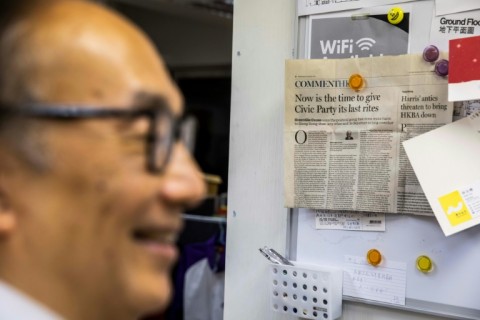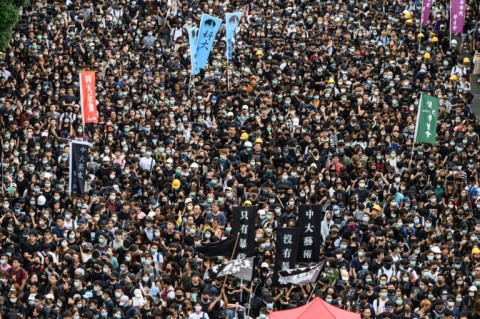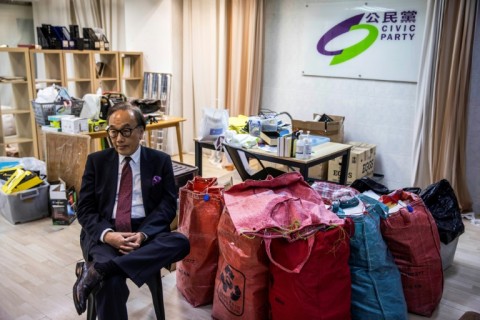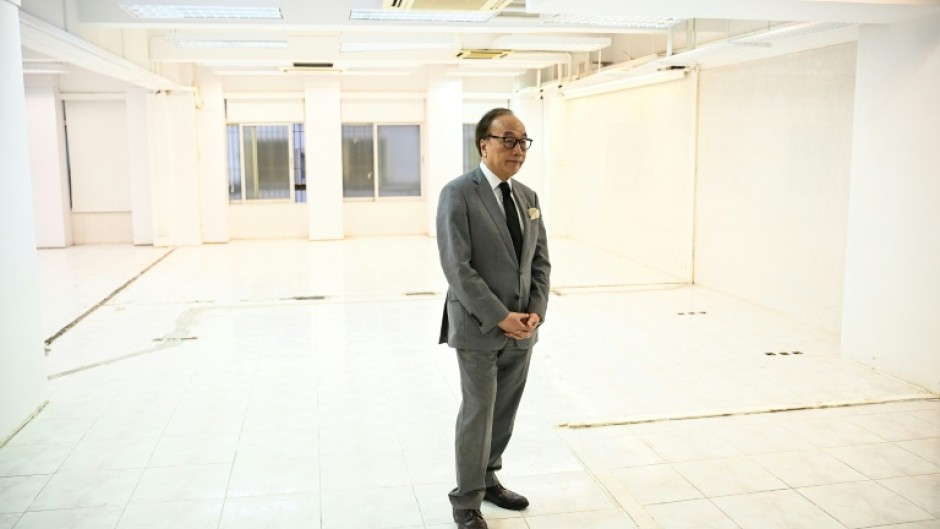Six lapel pins bearing the Civic Party's founding date are all Hong Kong veteran politician Alan Leong kept when the once-prominent opposition group cleared its headquarters and shuttered its doors days before the new year.
Founded in 2006, the Civic Party -- nicknamed "the barristers' party" -- was made up of attorneys, academics and other professionals who wanted to promote democratisation in Hong Kong, becoming at one point the city's second-largest opposition party in the legislative council.
"Times have changed," co-founder Leong said, speaking to AFP in a series of interviews during the party's six-month shutdown process.
Since China imposed a sweeping national security law that quelled dissent after massive pro-democracy protests rocked Hong Kong in 2019, the Civic Party has seen three members jailed, its elected politicians unseated and a former lawmaker listed as a most wanted fugitive.
Under a leadership vacuum, the party decided to disband in May.
In the final months of 2023, it donated its office furniture and campaign loudspeakers, and stripped bare its walls of newspaper clippings and party signage.

But Leong held on to the green-and-purple pins bearing the date "19.03.06" -- the party's birthday.
"What is left of the initial batch of the lapel pins would be all that we have," he told AFP.
The lawyer cited Hong Kong's "political reality" as well as a lack of money and morale as reasons for the party's closure.
"I have never doubted the ability of Hong Kong people ruling Hong Kong, but there are things that are beyond our control," he said.
"There are a few of our legislators who are still behind bars now. So that's reality. That also explains why we are winding ourselves up."
- 'Raise our spirits' -
Once an electoral reform advocacy group, the Civic Party was formed by four lawyers who were also lawmakers -- Ronny Tong, Margaret Ng, Audrey Eu and Leong.
Aspiring to become a "governing party", it recruited elites from different professions, such as civic engineer Albert Lai.

"It had then been a decade since Hong Kong's handover, but Beijing had not realised its promise of universal suffrage for the city... that was the triggering point of the party's formation," Lai told AFP.
Hong Kong was handed over from Britain to China in 1997, with Beijing promising a wide degree of freedoms and an "ultimate aim" of having the city's leader and lawmakers democratically elected.
But today, Hong Kong's chief executive is still chosen by Beijing loyalists.
And, in 2004, communist Beijing created more hurdles for electoral reform, fuelling an already simmering row over Hong Kong's "mini-constitution" -- which governs the territory separately from mainland China -- and bringing hundreds of thousands out to protest for greater democracy.
"Hong Kong's endurance has been tested to the limit," Ng wrote in the party's founding manifesto. "We must raise up our spirits again now."
In 2010, the party collaborated with its more radical peer -- the League of Social Democrats -- to trigger a by-election with the resignation of five pro-democracy legislators.
The parties said they aimed to create a symbolic referendum, allowing voters to show their support for democratisation, a move Beijing condemned as "unconstitutional".

Tong, a co-founder who defected from the party in 2015 to form his own group, said he was alarmed at the time by its "radicalisation".
"It was an act of confrontation," Tong, now a cabinet member, told a pro-government news outlet in June, "regretting" his part in creating the party.
- 'Patriots' only -
This year, Beijing's state television called the party an "anti-China destabilising organisation".
Seven Civic Party members have been prosecuted for leading pro-democracy protests, raising funds for demonstrators and joining an unofficial primary to shortlist legislative candidates -- which Hong Kong's government alleges to be a national security crime.
By the end of 2021, all its members on the city's district and legislative councils had been ousted under Beijing's "patriots" doctrine in which anyone deemed politically disloyal is weeded out from Hong Kong public office.
Dennis Kwok, one of the Civic Party's unseated lawmakers who now lives overseas, is wanted for "collusion" and has a HK$1 million ($128,000) bounty on his head.
With the party's closure and his resignation as its leader, Leong said he was "relieved because I can actually put down the burden".
History is cyclical and no one can predict the city's future, he added.
But, he said: "Should there come a time that professionals or the like can once again serve Hong Kong... I am sure another party will be born."

